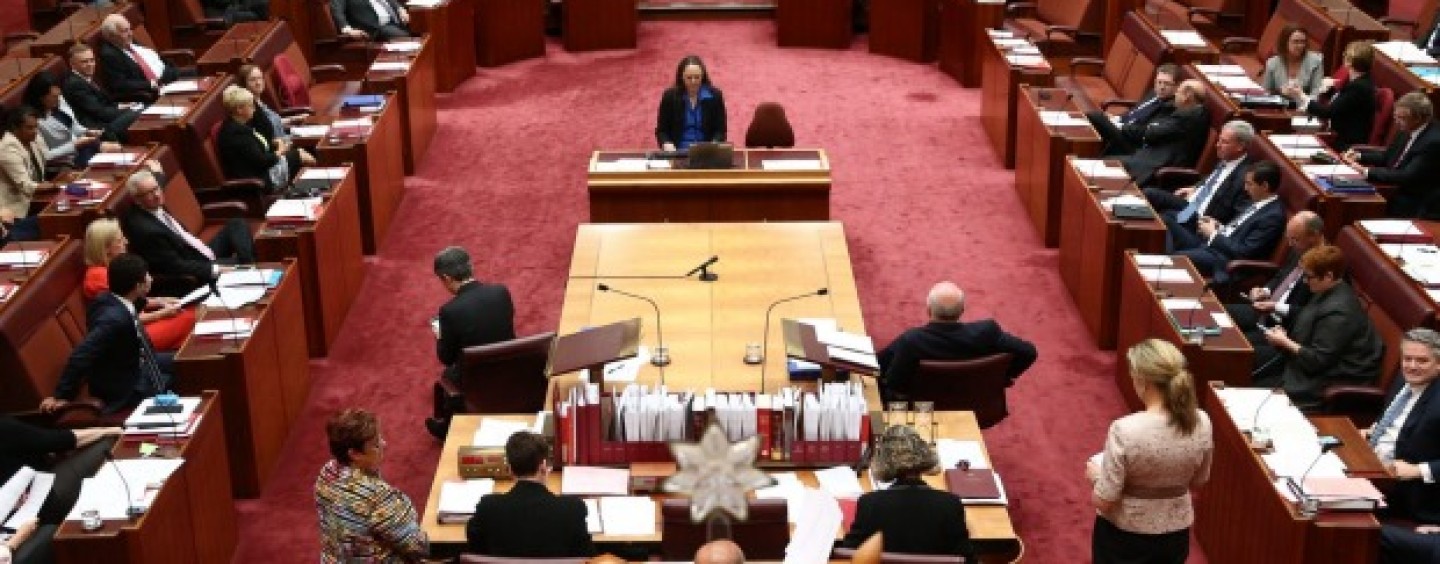When Bill Shorten is one of the few people talking sense on Senate voting reform, you know we have a problem. On Tuesday, he observed that “it is not in the nation’s interest or our economic future to give the Greens party the balance of power in the Senate”.
Shorten is well-qualified to comment. Labor was forced into a deadly embrace with the Greens once before. It wasn’t a pleasant experience for them or Australia, and Shorten is right to want to avoid it again.
The irony is that former Greens leader Bob Brown won the first Senate seat for the Greens in 1996 based on the current Senate voting system. The Liberals won three of the six Tasmanian Senate seats up for grabs, Labor won two, and Labor was ahead of Brown by 3450 votes in the race for the last seat. That’s where the race would have ended if optional preferential voting – the voting system the Coalition is about to enact into law with Greens support – was used to count the votes. Labor would have won the last seat, allowing Labor and the Liberals to strengthen their grip on national politics.
Thanks to Group Voting Tickets, the race for the last spot didn’t end. Instead, the Electoral Commission saw that more than 17,000 people had voted for the Democrats, who hadn’t won a seat. And the Democrats had told the Electoral Commission that if their votes didn’t elect a Democrat, those votes should be used to help elect a Greens candidate. The Democrats had also made this known to their members and anyone else who cared to listen.
So the Electoral Commission transferred these 17,000 votes from the Democrats to the Greens. Bob Brown overtook Labor, won the last Senate seat, and the era of the Greens on the national political scene was born.
Now take the Senate election in 2013. The Liberals/Nationals and Labor had both won two seats of the six that were up for grabs in New South Wales. I then won the fifth, leaving the Greens ahead of the Liberals’ Arthur Sinodinos by more than 100,000 votes in the race for sixth. If the Greens had their way and optional preferential voting were used, that’s where the race would have ended. The Greens would have won the last seat.
But the Electoral Commission saw that more than 250,000 people had voted for anti-Green parties like Shooters and Fishers, Motoring Enthusiasts, Christian Democrats, Fishing and Lifestyle Party, No Carbon Tax Climate Sceptics, and One Nation. None of these parties had won a seat, but each had told the Electoral Commission (plus their members and anyone else who cared to listen) that if their votes did not elect their own candidate, those votes should go to the Liberals before the Greens.
So the Electoral Commission transferred these 250,000 votes to the Liberals, and Arthur Sinodinos won the last Senate seat in New South Wales.
Now, in 2016, the Greens have become a major party. They can win more seats if they disenfranchise minor party supporters. They can also force Labor to negotiate with them in ways that should chill the blood of any Labor believer, particularly one who cares about Labor’s working-class traditions and commitment to improving the living standards of ordinary people. The Greens are a middle-class party. This is why they don’t care when ordinary people’s power bills go up because of their latest hare-brained environmental scheme, leaving Labor to do heavy lifting on behalf of the poor.
As one Labor MP commented privately, there’s more than a whiff of snobbery in the deal too, as though a sawmill worker, country vet, blacksmith, soldier, and builder will dirty up the Senate and should be discouraged.
On the Coalition side, the Nationals have been sucked in by delusions of future Senate workability. The Coalition agreement is based on the assumption that the option of going their separate ways is genuine. Indeed, that is the situation in WA. But once the new voting system becomes law, the Nationals will be bound irrevocably to the Liberals, with no prospect of independence. The two parties will rise and fall together.
The reforms planned by the Government are an unprincipled attack on democracy by those who would rather ‘the devil they know’ – the Greens – than anyone elected by the 1 in 4 people who don’t vote for the major parties. And it’s time more than just Bill Shorten spoke up about it.
From The Sydney Morning Herald, 24 February 2016






